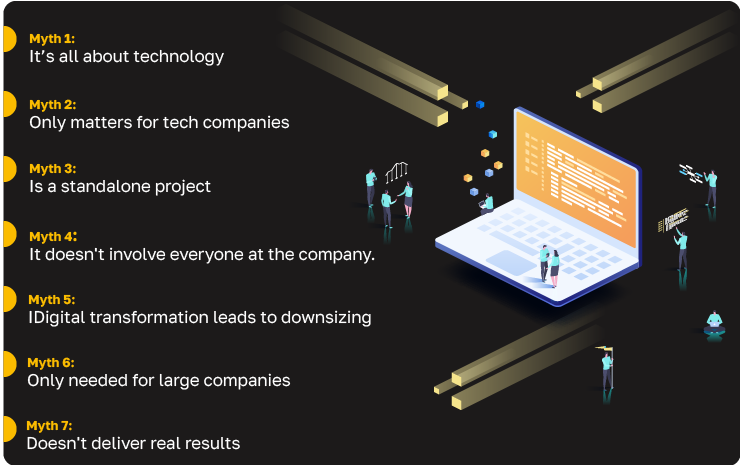Are you seeking clarity and direction in a sea of tech jargon? Are various myths and misconceptions clouding your path? This sense may affect you personally, casting a shadow of indecision and skepticism over your strategic decisions.
We’ve all faced these challenges, watching the digital landscape evolve rapidly and feeling excited and intimidated by the possibilities. That’s why, with our years of experience with digital technologies, WillDom is here to serve as a guide and tackle these myths head-on.
What Is Digital Transformation?
Digital transformation consists in reimagining business strategies, processes, and customer engagements through the use of digital technology.
For example, imagine a retail store fully operating on-site, with traditional tools such as a notepad for inventory management, a customer database, and even accounting processes. Tired of a lack of productivity and efficiency, they decided to start an e-commerce platform where they can target a more diverse audience and facilitate real-time stock updates, online payment methods, and higher customer satisfaction.
That’s digital transformation! It enhances operational efficiencies and customer experiences, fostering a culture of continuous innovation and adaptation to evolving market demands.
Why Is Digital Transformation Important?
Digital transformation is essential because it allows companies to unlock new value, streamline operations, enhance customer experiences, and foster a culture of innovation, ensuring long-term sustainability. Additionally, it allows companies to reduce operating expenses by automating tedious tasks previously performed by hand.
Without embracing the digital transformation process, organizations risk falling behind, losing market share, and becoming obsolete against digital-savvy competitors.
7 Most Common Myths of Digital Transformation
In digital transformation, many myths can mislead and cause costly missteps in an organization’s journey toward digital maturity.
Here are seven of the most common myths and how they differ from reality:

Myth 1: It’s all about technology
A common misconception is that digital transformation is synonymous with acquiring the latest technology. It’s easy to believe that simply investing in new software or hardware is enough to stay ahead.
Tech-driven change is as much about people and business processes as it is about technology. It involves rethinking existing business models and strategies to leverage emerging technologies effectively, ensuring that digital tools enhance efficiency, customer experience, and innovation.
Myth 2: Only matters for tech companies
There’s a belief that digital transformation is only critical for Silicon Valley giants and tech startups. This myth confines the potential of digital initiatives to a narrow sector of the economy.
However, digital innovation is imperative across all industries. Every sector, from manufacturing to healthcare, can benefit from digital innovations like business process automation tools to improve operations, customer interactions, and competitiveness in a digital-first world.
Myth 3: Is a standalone project
Many view digital transformation as a box to be checked, a one-off project that, once completed, will put their organization on the right track indefinitely.
However, digital modernization is an ongoing journey with technological advancements and changing market demands. It’s not about reaching a final destination but about keeping up with digital transformation trends and cultivating a culture of continuous improvement and agility in the rapidly evolving digital landscape.
How long does a typical digital transformation take?
There’s no universal timeline for digital transformation. It varies based on the organization’s size, industry, and specific goals. The key is maintaining momentum and adaptability, ensuring the transformation process responds to new insights and opportunities.
Myth 4: It doesn’t involve everyone at the company.
Some believe that digital transformation is the IT department’s or top management’s sole responsibility, overlooking the broader organizational impact.
The reality is that a successful digital transformation requires the engagement and collaboration of the entire organization. Everyone plays a crucial role in driving and adopting change, making it essential to foster a digital culture that embraces innovation at all levels.
Myth 5: Digital transformation leads to downsizing
A common fear is that digital innovation will automate jobs and lead to widespread downsizing, with technology replacing human workers.
Tech innovation often leads to job transformation rather than elimination. It opens up opportunities for upskilling and reskilling, allowing employees to shift from mundane tasks to more strategic and creative roles, thereby adding excellent value to the organization.
Myth 6: Only needed for large companies
It’s a misconception that only large corporations with substantial resources can afford to undertake digital transformation initiatives.
Tech modernization is accessible to businesses of all sizes. Smaller organizations, in fact, often have the agility to adapt and innovate more quickly, leveraging digital tools to level the playing field and compete with larger counterparts.
Myth 7: Doesn’t deliver real results
Skeptics argue that tech innovation is more hype than substance, with rare and elusive tangible outcomes.
However, countless success stories and empirical evidence contradict this myth. When executed strategically, a digital transformation plan can significantly improve efficiency, customer satisfaction, and financial performance, demonstrating its undeniable value and impact.

Can Digital Transformation Happen Without a Significant IT Budget?
Yes, digital transformation is possible even on a modest IT budget. It’s about leveraging cost-effective cloud-based solutions and adopting a phased approach to digital adoption, ensuring that each step delivers value and supports broader business objectives like meeting evolving customer expectations.
How Does Digital Transformation Affect Data Security and Privacy?
As businesses embark on their digital transformation journeys, integrating advanced technologies and digitizing processes, data security and privacy implications become increasingly vital. The stakes for data protection in a digital ecosystem are higher than ever, with potential repercussions that can affect every facet of an organization.
Here are three ways in which digital transformation affects data security and privacy:
#1 – Increased vulnerability points
Technological evolution expands an organization’s digital footprint, inherently increasing the number of potential vulnerability points. As businesses adopt cloud services, IoT devices, and mobile technologies, the perimeter that needs defending extends far beyond traditional network boundaries.
#2 – Data governance challenges
With the digital shift, the volume, velocity, and variety of data organizations handle surge exponentially. Therefore, effective technological transformation strategies must include sophisticated data governance frameworks that address storage and access and ensure that data usage complies with legal and ethical standards.
#3 – Emergence of sophisticated threats
As organizations digitize, cyber threats become more sophisticated, leveraging advanced technologies like AI and machine learning to carry out attacks. Phishing, ransomware, and other cyber threats evolve, becoming more adept at bypassing traditional security measures. Organizations must invest in continuous security training for employees and employ cutting-edge security solutions.
Can an Organization Be Too Late to Start Digital Transformation?
It’s never too late to embark on a digital transformation journey. While early adopters may gain a competitive edge, there is always room for improvement and innovation. The key is to start with a clear vision and strategic plan, continuously adapting to the digital landscape’s demands.

We Can Help You Have a Smooth Digital Transformation Journey!
While in-house teams possess intimate knowledge of the company’s operations and culture, they might lack the specialized expertise required to navigate the complexities of digital transformation. This gap can lead to suboptimal strategy execution, overlooked opportunities for innovation, and potential misalignment with industry best practices.
This is where WillDom is your ideal partner for a seamless digital transformation journey. With our extensive expertise in digital innovation and a proven track record of successful transformations across industries, we’re uniquely equipped to guide your business through this vital transition. We craft tailored strategies that align with your unique business objectives and cultural nuances. Contact WillDom today to leverage our global tech talent network and cutting-edge solutions!

